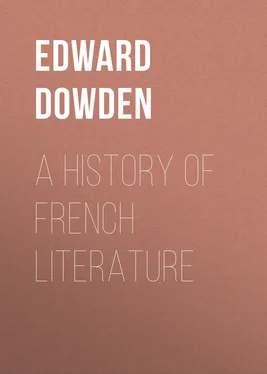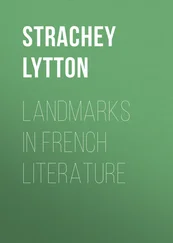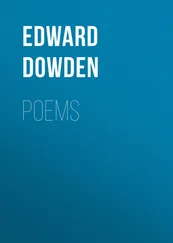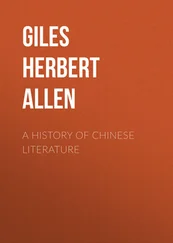Edward Dowden - A History of French Literature
Здесь есть возможность читать онлайн «Edward Dowden - A History of French Literature» — ознакомительный отрывок электронной книги совершенно бесплатно, а после прочтения отрывка купить полную версию. В некоторых случаях можно слушать аудио, скачать через торрент в формате fb2 и присутствует краткое содержание. Жанр: foreign_prose, foreign_home, Критика, Языкознание, foreign_antique, на английском языке. Описание произведения, (предисловие) а так же отзывы посетителей доступны на портале библиотеки ЛибКат.
- Название:A History of French Literature
- Автор:
- Жанр:
- Год:неизвестен
- ISBN:нет данных
- Рейтинг книги:3 / 5. Голосов: 1
-
Избранное:Добавить в избранное
- Отзывы:
-
Ваша оценка:
- 60
- 1
- 2
- 3
- 4
- 5
A History of French Literature: краткое содержание, описание и аннотация
Предлагаем к чтению аннотацию, описание, краткое содержание или предисловие (зависит от того, что написал сам автор книги «A History of French Literature»). Если вы не нашли необходимую информацию о книге — напишите в комментариях, мы постараемся отыскать её.
A History of French Literature — читать онлайн ознакомительный отрывок
Ниже представлен текст книги, разбитый по страницам. Система сохранения места последней прочитанной страницы, позволяет с удобством читать онлайн бесплатно книгу «A History of French Literature», без необходимости каждый раз заново искать на чём Вы остановились. Поставьте закладку, и сможете в любой момент перейти на страницу, на которой закончили чтение.
Интервал:
Закладка:
To pluck the rose in the garden of delight is to win the maiden; her fears, her virgin modesty and pride, her kindness, her pity, are the company of friends or foes by whom the rose is surrounded; and to harmonise the real and the ideal, all the incidents are placed in the setting of a dream. Wandering one spring morning by the river-banks, the dreamer finds himself outside the walls of a fair orchard, owned by Déduit (Pleasure), of which the portress is Oiseuse (Idleness); on the walls are painted figures of Hatred, Envy, Sadness, Old Age, Poverty, and other evil powers; but unterrified by these, he enters, and finds a company of dancers on the turf, among whom is Beauty, led by the god of Love. Surrounded by a thorny hedge is the rosebud on which all his desire now centres. He is wounded by the arrows of Love, does homage to the god, and learns his commandments and the evils and the gains of love. Invited by Bel-Accueil, the son of Courtoisie, to approach the rose, he is driven back by Danger and his companions, the guardians of the blossom. Raison descends from a tower and discourses against the service of Love; Ami offers his consolations; at length the lover is again admitted to the flowery precinct, finds his rosebud half unclosed, and obtains the joy of a kiss. But Jealousy raises an unscalable wall around the rose; the serviceable Bel-Accueil is imprisoned, and with a long lament of the lover, the poem (line 4068) closes.
Did Guillaume de Lorris ever complete his poem, or did he die while it was still but half composed? We may conjecture that it wanted little to reach some dénouement—perhaps the fulfilment of the lover's hopes; and it is not impossible that a lost fragment actually brought the love-tale to its issue. But even if the story remained without an end, we possess in Guillaume's poem a complete mediæval Art of Love; and if the amorous metaphysics are sometimes cold, conventional, or laboured, we have gracious allegories, pieces of brilliant description, vivid personifications, and something of ingenious analysis of human passion. Nevertheless the work of this Middle-Age disciple of Ovid and of Chrétien de Troyes owes more than half its celebrity to the continuation, conceived in an entirely opposite spirit, by his successor, Jean de Meun.
The contrast is striking: Guillaume de Lorris was a refined and graceful exponent of the conventional doctrine of love, a seemly celebrant in the cult of woman, an ingenious decorator of accepted ideas; Jean de Meun was a passionate and positive spirit, an ardent speculator in social, political, and scientific questions, one who cared nothing for amorous subtleties, and held woman in scorn. Guillaume addressed an aristocratic audience, imbued with the sentiments of chivalry; Jean was a bourgeois, eager to instruct, to arouse, to inflame his fellows in a multitude of matters which concerned the welfare of their lives. He was little concerned for the lover and his rose, but was deeply interested in the condition of society, the corruptions of religion, the advance of knowledge. He turned from ideals which seemed spurious to reason and to nature; he had read widely in Latin literature, and found much that suited his mood and mind in Boethius' De Consolatione Philosophiæ and in the De Planctu Naturæ of the "universal doctor" of the twelfth century, Alain de Lille, from each of which he conveyed freely into his poem. Of his life we know little; Jean Clopinel was born at Meun on the Loire about the year 1240; he died before the close of 1305; his continuation of Guillaume's Roman was made about 1270. His later poems, a Testament , in which he warned and exhorted his contemporaries of every class, the Codicille , which incited to almsgiving, and his numerous translations, prove the unabated energy of his mind in his elder years.
The rose is plucked by the lover in the end; but lover and rose are almost forgotten in Jean's zeal in setting forth his views of life, and in forming an encyclopædia of the knowledge of his time. Reason discourses on the dangers of passion, commends friendship or universal philanthropy as wiser than love, warns against the instability of fortune and the deceits of riches, and sets charity high above justice; if love be commendable, it is as the device of nature for the continuation of the species. The way to win woman and to keep her loyalty is now the unhappy way of squandered largess; formerly it was not so in the golden age of equality, before private property was known, when all men held in common the goods of the earth, and robber kings were evils of the future. The god of Love and his barons, with the hypocrite monk Faux-Semblant—a bitter satirist of the mendicant orders—besiege the tower in which Bel-Accueil is imprisoned, and by force and fraud an entrance is effected. The old beldame, who watches over the captive, is corrupted by promises and gifts, and frankly exposes her own iniquities and those of her sex. War is waged against the guardians of the rose, Venus, sworn enemy of chastity, aiding the assailants. Nature, devoted to the continuance of the race, mourns over the violation of her laws by man, unburdens herself of all her scientific lore in a confession to her chaplain Génius, and sends him forth to encourage the lover's party with a bold discourse against the crime of virginity. The triumph of the lover closes the poem.
The graceful design of the earlier poet is disregarded; the love-story becomes a mere frame for setting forth the views of Jean de Meun, his criticism of the chivalric ideal, his satire upon the monkish vices, his revolutionary notions respecting property and government, his advanced opinions in science, his frank realism as to the relations of man and woman. He possesses all the learning of his time, and an accomplished judgment in the literature which he had studied. He is a powerful satirist, and passages of narrative and description show that he had a poet's feeling for beauty; he handles the language with the strength and skill of a master. On the other hand, he lacks all sense of proportion, and cannot shape an imaginative plan; his prolixity wearies the reader, and it cannot be denied that as a moral reformer he sometimes topples into immorality. The success of the poem was extraordinary, and extended far beyond France. It was attacked and defended, and up to the time of Ronsard its influence on the progress of literature—encouraging, as it did, to excess the art of allegory and personification—if less than has commonly been alleged, was unquestionably important.
CHAPTER III
DIDACTIC LITERATURE—SERMONS—HISTORY
I
DIDACTIC LITERATURE
The didactic literature, moral and scientific, of the Middle Ages is abundant, and possesses much curious interest, but it is seldom original in substance, and seldom valuable from the point of view of literary style. In great part it is translated or derived from Latin sources. The writers were often clerks or laymen who had turned from the vanities of youth—fabliau or romance—and now aimed at edification or instruction. Science in the hands of the clergy must needs be spiritualised and moralised; there were sermons to be found in stones, pious allegories in beast and bird; mystic meanings in the alphabet, in grammar, in the chase, in the tourney, in the game of chess. Ovid and Virgil were sanctified to religious uses. The earliest versified Bestiary, which is also a Volucrary, a Herbary, and a Lapidary, that of Philippe de Thaon (before 1135), is versified from the Latin Physiologus , itself a translation from the work of an Alexandrian Greek of the second century. In its symbolic zoology the lion and the pelican are emblems of Christ; the unicorn is God; the crocodile is the devil; the stones "turrobolen," which blaze when they approach each other, are representative of man and woman. A Bestiaire d'Amour was written by Richard de Fournival, in which the emblems serve for the interpretation of human love. A Lapidary, with a medical—not a moral—purpose, by Marbode, Bishop of Rennes, was translated more than once into French, and had, indeed, an European fame.
Читать дальшеИнтервал:
Закладка:
Похожие книги на «A History of French Literature»
Представляем Вашему вниманию похожие книги на «A History of French Literature» списком для выбора. Мы отобрали схожую по названию и смыслу литературу в надежде предоставить читателям больше вариантов отыскать новые, интересные, ещё непрочитанные произведения.
Обсуждение, отзывы о книге «A History of French Literature» и просто собственные мнения читателей. Оставьте ваши комментарии, напишите, что Вы думаете о произведении, его смысле или главных героях. Укажите что конкретно понравилось, а что нет, и почему Вы так считаете.












